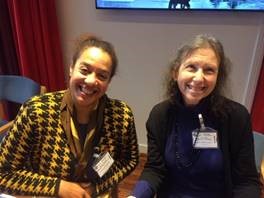News in 2019

|
FIG Partnership
Working within the Global Land Tool Network: Annual Steering Committee
Meeting
Hosted by Swedish International Development Agency (SIDA), 7-8
February 2019, Stockholm, Sweden

Participants of the inaugural GLTN Steering Committee meeting hosted by
SIDA at their Stockholm offices in Sweden.
Vice President Diane Dumashie attended the GLTN steering committee
(see members) in Stockholm, and kindly hosted by Swedish
International Development Agency (SIDA). This is a significant
milestone meeting on several fronts. First, continuing growth of
the network with 80 partner members, this has an impact on the way we
operate. Next, to accommodate the successful and increasing reach
of the GLTN partners activities a new governance structure has been
agreed that will enable greater efficiencies and clearer accountability.
Finally, and above all, it was a pleasure to welcome Mr Victor Kisob,
Deputy Executive Director of UN Habitat, as the new chair of the
Steering Committee. And appreciation was given to UN Habitat for
their continuing support to the network and facilitating the GLTN
Secretariats operations.
Established in 2006, the Global Land Tool Network (GLTN) is celebrating
12 years as an alliance of diverse international organizations that
contribute to poverty alleviation and sustainable development through
improvements to security of tenure and land governance. The
network is an important platform for FIG, and we were instrumental in
its formation in 2006, and were amongst the originating partner members.
Over the years FIG members’ have been actively engaged, led by our
Council and rolled-out in the work plans of our Commission, Africa
Regional Network, and Young Surveyors Networks. In 2018, our
contribution was duly acknowledged by the former head of GTLN, Clarissa
Augustinus
We have been at the forefront of
GLTN activities; on land tool development, on testing and dissemination
innovative methods, focusing on urgently needed, and priority land
tools, and promoting and facilitating the adoption at scale of land
tools and practices that promote tenure security and to develop the
capacity needed for fit for- purpose implementation.
The Network is heading into a new programmatic phase III, within a
global context characterized by both challenges and opportunities in the
land sector. After 12 years of interventions and innovations in the land
sector by GLTN partners, it’s noticeable that tenure security has gained
momentum in both national and global contexts; and has also generated
awareness among decisions makers and beneficiaries at community level,
in addition to the progress that land issues have made in the Global
agenda- led by the Sustainable development Goals, and supported by the
New Urban Agenda.
Accordingly, the meeting aim was set against the backdrop of a common
vision outlined in the Strategy plan (2018- 2030), and understanding the
strategic objectives for the current GLTN Phase 3 implementation. To
assist this debate Diane Dumashie presented an outline of the emerging
land environment
Bearing in mind the emerging new challenges in the land sector,
including resources and capacity issues, the steering committee
discussions centred upon:
- Agreeing to the mechanisms and key
actions of how to engage the Network partners in delivering the Phase 3
Strategy.
- Agreeing how partners will better
contribute to the implementation of the Phase 3 Programme and
- To identify strategies and avenues
for strategic innovations.

Dr Diane Dumashie, FIG Vice-President and Professional Cluster co-lead
in discussion with Ms Jane Katz from Habitat for Humanity and the Urban
Civil Society Cluster co-lead.
Today, there is a global consensus on the need to provide tenure
security to achieve the Sustainable Development Goals (SDGs) and the New
Urban Agenda. These frameworks offer new opportunities for GLTN partners
and the Network to become more relevant in contribution towards
addressing tenure security for various purposes including poverty
alleviation, food security, gender equality, peace and stability
2019 is an impactful and exciting chapter for GLTN into phase 3.
FIG members are a key part of the GLTN network, and working together
with partners in the Professional cluster (FIG co-chairs with the Arab
Union of Surveyors) and across to clusters (such as Urban, Rural and
Academic clusters), we are strategically placed to help countries
deliver on the SDG’s steered by the GLTN Stagey documents 2018- 2030 and
our own FIG work plans.
Partnership working is key to leveraging resources, GLTN remains
grateful to all our donors: the government of Netherlands, Sweden,
Germany, Switzerland and Norway and our development partners, IFAD,
UNECA and UN Women for their past and continued investment and support
to the GLTN Agenda since inception but above all to those from our own
FIG network that remain involved.
If you require further information do not hesitate to contact FIG Vice
President Diane Dumashie (Co- chair GLTN Professional Cluster)
* Members of the Steering Committee:
- UN-Habitat (Deputy Executive
Director)
- International Federation of Surveyors
- University of East
London
- Technical University of Munich
- Huairou Commission
- Asian
Coalition for Agrarian Reform and Rural - Development (ANGOC)
- Habitat
for Humanity
- Slum Dwellers International
- Arab Union of Surveyors
- Representative of Member States
- Development Partners
Resources Institutions:
- International Land Coalition,
- Land Tenure
Facility,
- GLTN Secretariat
Diane Dumashie
February 2019

























